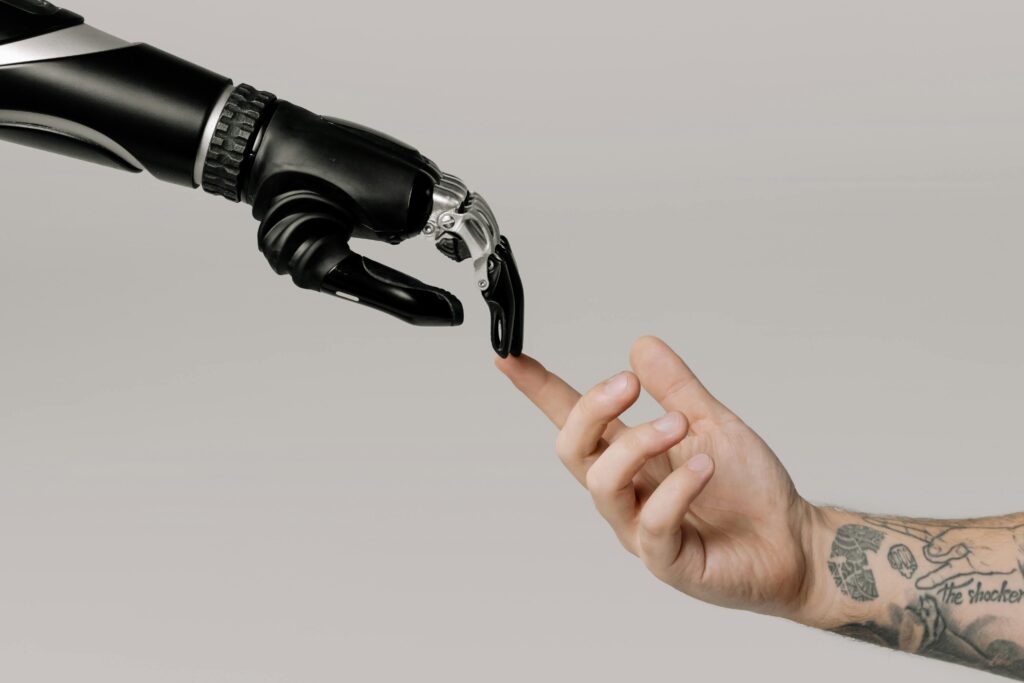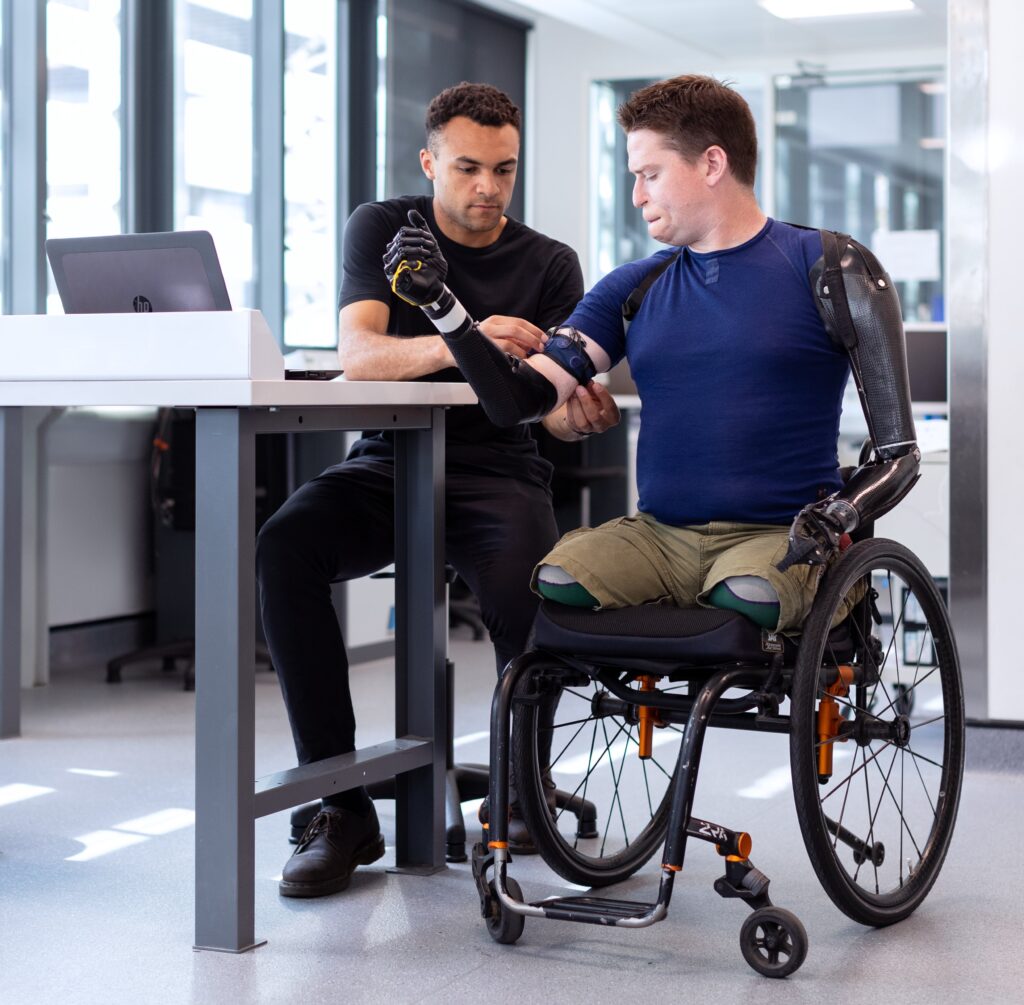AI and the Future of Work
- 24 Jan 2024
- 8 min read

Artificial intelligence (AI) is reshaping the tech industry, driving transformative changes in the way we work. From automating routine tasks to enabling groundbreaking insights, AI unlocks new possibilities and powers cutting-edge technologies. As the future unfolds, AI's role in the tech industry will be pivotal, redefining work paradigms and fostering a world driven by innovation
Now read that back again. Did you notice that AI wrote the first paragraph of this article? Probably not. All that was written there is factually correct. It sounds good on paper and is compelling enough to include in this article. But it was written by an AI engine called ChatGPT after being asked to, “write an introductory paragraph for an article about AI being the future of work in the tech industry.”
Aside from writing introductory paragraphs for blog articles, AI is used in a wide range of applications, from automating tasks to analysing data and making predictions. The technology used in self-driving cars, personalised customer support experiences, and remote medical diagnoses is also powered by AI. It is fundamentally changing the way we work, and essentially, the future is here.
AI tools are projected to generate over $2.9 trillion in corporate value over the next few years. To get a piece of that pie, it’s important to reskill and upskill to keep up with the rate of change.
AI is Changing the Way We Work
I’m sure you’ve seen the articles with headlines that read, “AI Will Take Your Job,” or something to that effect. The truth is, if you learn to use AI to your advantage, AI can take your career to reach new heights.
By 2025, it is projected that around 85 million jobs will be replaced by AI. This is a scary prospect until you realise that, over the same period of time, AI is expected to create roughly 97 million new jobs. In order to tap into the jobs that “the robot revolution” will create, workers need to learn how to master these new technologies by upskilling or reskilling. It can be as simple as doing some research on your own or taking an online course, like those offered through ALX Africa.
The professionals who can adapt, upskill and reskill successfully will be rewarded with an abundance of work opportunities. The key is keeping your ear to the ground and to be aware of changes as they happen.
AI and the Healthcare Industry
In healthcare, AI is being used to improve medical diagnosis and treatment. AI algorithms can analyse medical images, predict patient outcomes, and even suggest treatment plans. Job roles in this field include AI healthcare specialist and medical data analyst, whose task is to leverage AI to enhance patient care and hospital operations.
AI healthcare specialists work closely with medical professionals to develop AI models that can assist in diagnosis, treatment planning, and patient monitoring. These professionals need a deep understanding of medical data and AI algorithms to ensure that the AI systems are accurate and reliable.
Medical data analysts use AI techniques to analyse large volumes of medical data, such as patient records and clinical trials, to extract meaningful insights. They help healthcare organisations make data-driven decisions and improve patient care overall.

AI and Finance
In finance, AI is used for investment analysis and risk management. AI algorithms are able to analyse financial markets, predict stock trends, and identify investment opportunities on their own. Job roles in this industry include AI financial analyst and algorithmic trader, who use AI to make informed financial decisions and optimise trading strategies.
AI financial analysts leverage AI models to analyse financial data, identify patterns, and generate insights that can inform investment decisions. They work closely with investment teams to develop AI-based investment strategies and improve portfolio performance.
Algorithmic traders utilise AI algorithms to automate trading strategies and optimise trade execution. Using AI models, they analyse market data, identify trading opportunities, and execute trades with speed and precision.
AI in Manufacturing
In manufacturing, AI is used for automation and predictive maintenance. AI algorithms optimise production processes, predict equipment failures, and reduce downtime. Job roles in this field include AI engineer and manufacturing data scientist, who use AI to improve manufacturing efficiency and product quality.
AI engineers in manufacturing develop AI systems that automate various aspects of the production process. By leveraging AI algorithms, they can optimise production schedules, monitor equipment performance, and ensure efficient resource allocation.
Manufacturing data scientists analyse large volumes of manufacturing data to identify patterns and trends that can help improve product quality and optimise production processes. They develop AI models that can predict equipment failures, detect anomalies, and recommend maintenance actions.
Customer Service and AI
In customer service, AI is used to develop chatbots and virtual assistants. (Check out ALX’s own LEA (Learner Experience Assistant).) These AI-powered tools can handle customer queries, provide personalised recommendations, and improve customer experience. Job roles in this field include AI customer service specialist and chatbot developer.
AI customer service specialists work on developing AI systems that can understand and respond to customer queries effectively. By using AI algorithms, natural language processing techniques, and machine learning models, they provide personalised and accurate responses to customer inquiries.
Chatbot developers design and build chatbot applications that can simulate human-like conversations and assist customers with their queries. They utilise AI technologies such as natural language processing and machine learning to train chatbots to understand and respond to customer needs.
Future Trends and Opportunities in AI
AI's potential impact on the job market is immense. It is expected to create new job roles, automate routine tasks, and increase the demand for AI skills. Emerging areas in AI, such as autonomous vehicles and robotics, are set to offer exciting career opportunities. To seize these opportunities, continuous learning and upskilling are essential for staying relevant and achieving long-term success in the AI field.
As AI continues to advance, it is essential for professionals to stay updated with the latest trends and technologies. Continuous learning through online courses, attending conferences, and engaging with the AI community will ensure that professionals are equipped with the skills needed to thrive in the AI-driven job market.

Learning and Developing AI Skills
There are several ways to learn and develop AI skills. Online courses and certifications can provide a structured learning path and validate your AI expertise.
ALX Africa offers a free AI career skills programme called AiCE – AI Career Essentials. This programme combines an introduction to various AI tools with key features of essential soft skills training. Some of these soft skills include leadership, communication, entrepreneurship, and career success training that forms you into a well-rounded professional.
Applications are now open, so be sure to secure your spot in our next cohort! Apply now on our website.
There are other ways to learn and develop your AI skills aside from training programmes. Participating in AI competitions and hackathons can offer hands-on experience and an opportunity to apply your AI skills to real-world problems. Platforms like Kaggle host AI competitions where participants can solve challenging problems and showcase their skills to the AI community.
Joining AI communities and attending conferences can provide networking opportunities, exposure to the latest AI trends, and insights from AI experts. The ALX community also provides mentorship and networking opportunities for AI skills advancement.
Summary
The future of work is here. AI is changing industries like healthcare, finance, manufacturing, and customer service, and more, creating new opportunities alongside automation. But to take advantage of these exciting possibilities, upskilling and reskilling are crucial.
ALX Africa's AI Career Essentials (AiCE) programme is your gateway to mastering essential AI tools and key soft skills like leadership, communication, and entrepreneurship. Applications are open now! Don't miss out on shaping your future in the AI-powered world.
FAQs
1. Will AI steal my job?
The short answer is not necessarily. While AI automates certain tasks, it often creates new ones. Jobs requiring creativity, critical thinking, and social skills will likely remain in high demand. However, some routine and data-driven roles might transition to AI, requiring workers to adapt and reskill.
2. What skills will I need to succeed in the AI era?
The future of work demands a focus on soft skills like communication, collaboration, problem-solving, and adaptability. Additionally, skills in data analysis, coding, and understanding AI principles will become increasingly valuable. Continuous learning and upskilling will be crucial to stay relevant in the evolving job market.
3. How can I prepare for the AI-powered future?
Here are some ways to get ready:
- Stay informed: Learn about AI and its potential impact on your industry.
- Develop your soft skills: Enhance your communication, teamwork, and critical thinking abilities.
- Embrace lifelong learning: Take courses, attend workshops, and seek new challenges to keep your skills sharp.
- Network with others: Build connections with people in your field and other relevant industries.
- Consider upskilling: Explore opportunities to learn new skills related to AI and data analysis.
 Ghana
Ghana  Ethiopia
Ethiopia  Egypt
Egypt  Morocco
Morocco  South Africa
South Africa  Rwanda
Rwanda  Nigeria
Nigeria  Kenya
Kenya 